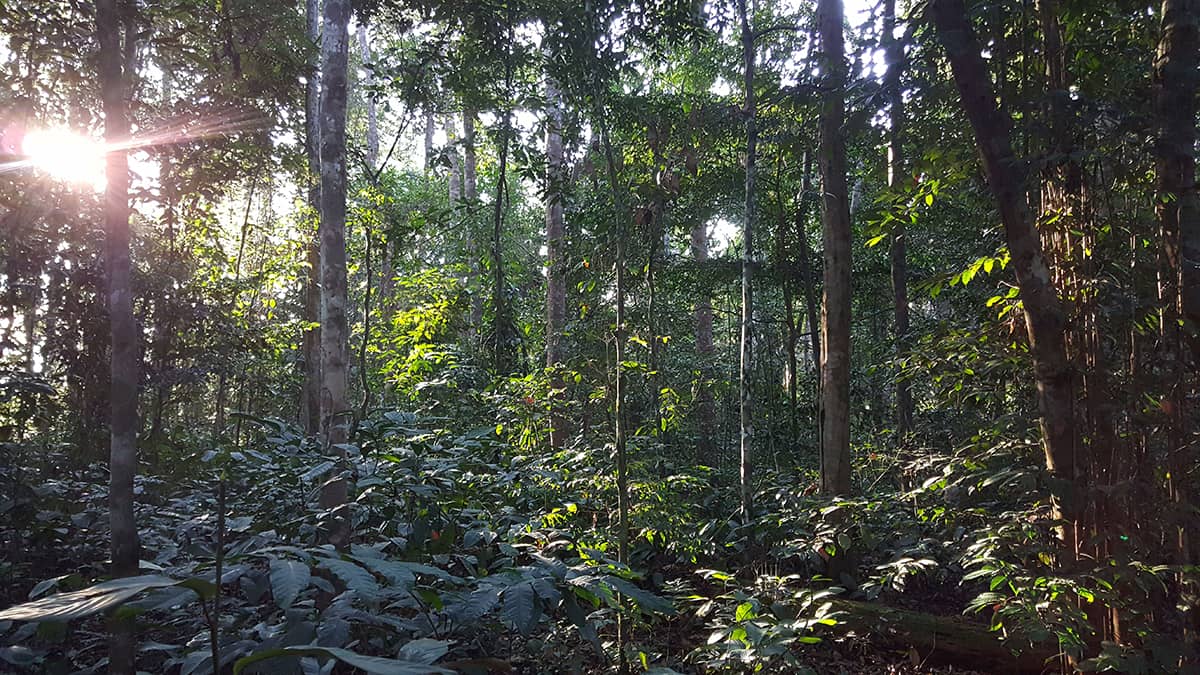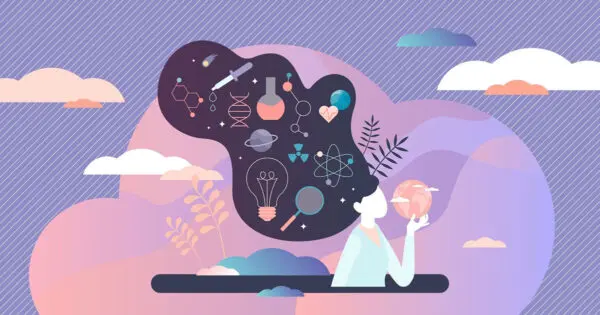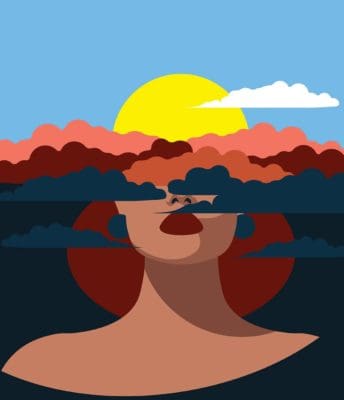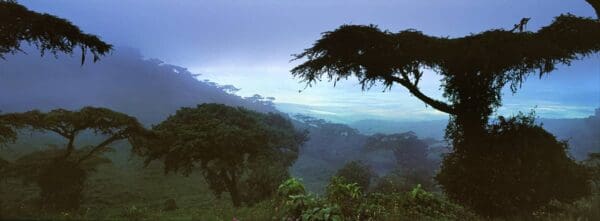A Conservation About Bwiti and iboga with David “Okoukwe” Stetson
David Stetson is an iboga and ibogaine provider. He was initiated into a Bwiti tribe in 2007 while living in Gabon, where he also learned to play the Bwiti musical instruments. He went on to work at treatment centers in Costa Rica and Mexico and is an extremely talented facilitator of this medicine. I caught him for a conversation where I attempted to have him define what Bwiti is and iboga’s role within Bwiti.
A note for context: iboga is short for Tabernanthe iboga, which is a perennial shrub that grows in equatorial West Africa, most predominantly in Gabon. Ibogaine is an alkaloid that is found in the root bark of iboga and is extracted for use in the western hemisphere, usually for reasons of mental health, substance use disorder, or spiritual development. The root bark is known as a sacrament and a rite of passage for Bwitists who eat it raw or ground up. Large amounts of it produce lengthy dream-like states that are used to initiate younger members into the Bwiti tribal system.
Attempting to Define Bwiti and Iboga’s Role Within Bwiti
Shea: As I talk, read, and write about ibogaine and iboga, the word ‘Bwiti’ always comes up. Unfortunately, very little information comes up in a Google search; typically the same three or four sentences are always used to describe Bwiti online. The way I’ve always understood it is that it’s a tribal system, or a belief system, or maybe a little bit of both. I think a lot of people call it a religion because Gabon recognizes it as that. So, can you tell me, what is Bwiti?
David: I think the reason why it is so hard to find definitive answers to these broad questions online is that there isn’t an answer, and that is because of how Bwiti is in Gabon. Bwiti exists in cells.
The main thing that connects them is that they are all using iboga. There are some commonalities beyond iboga consumption. For example, the origin of Bwiti came from the Pygmy people, and they all credit the Pygmy people– or forest dwellers — for teaching them about iboga. The Pygmies know every plant and they know every animal and they don’t know the western world at all. That seems to be the same between all of the cells. These seem to be the anchors that exist across all temples of Bwiti in Gabon.
I am going to pause you right there — can you clarify that Bwiti is Gabonese?
Bwiti exists in Gabon. There are a few cells in Cameroon and maybe parts of the Congo, but Bwiti is primarily Gabonese.
I see. So coming back to Bwiti I often hear that the Pygmy people used iboga, and then somewhere down the line they taught people how to use it and those people are now the Bwiti people. But if I don’t understand the meaning of Bwiti, it’s hard to understand the importance of the lineage of iboga.
There is a huge component that westerners will never understand, for two reasons. One, Bwitists make a conscious attempt to not let everyone in the door fully. There are a lot of secrets in Bwiti, even if you are Gabonese!
A lot of Bwiti sects and temples require a long time commitment, during which you’ll slowly get access to these “secrets.” Secrets can be language-related, or about symbols that are used; more and more information is revealed as you go along in Bwiti. There are members of sects that have been members for 40 years and they might not even know everything there is to know about Bwiti. Some of these secrets they might never tell white people.
The second is that we can’t be privy to what Bwiti means because we aren’t African. We aren’t conditioned to that environment. We didn’t grow up in the jungle. I think Bwiti is largely a response to the way of life one is subjected to in the jungle — which is something we will never know. It’s dangerous in the jungle. For example, the life expectancy of a Pygmy who is living completely off the land in the jungle is something like 30 years old. That starts to show you how hard life is and how you can die at any moment, from so many different factors.
I think Bwiti is not a remedy for that, but it goes alongside that way of life. But, to me — Bwiti is and should be — a celebratory way of life.
And is it a tribal system or a belief system? You can call it that, but my point is it is a way of life.
I like that. It is so different from anything here. I feel like I was brought up to be productive, pay my bills, but the idea of celebration as a way of life is intriguing and nice. What is the culture like?
You know, it’s similar to the Mexico and Central American ibogaine clinic culture. I don’t have to tell you how much blasphemy there is between providers, like character assassinations, gossip — whether they are true or not — and in Gabon between different Bwiti cells, it is similar.
In Gabon, they accuse every other temple of witchcraft, of using iboga improperly or with malice and ill intent, to hypnotize people or to coerce them. This isn’t rampant, but it happens enough that people talk about it. Even if it’s to make one temple look better than the other — that is definitely going on in Gabon — just as it goes on in the clinics in Mexico. So that is kind of one thing that anchors iboga for me (laughs).
That is really interesting. I think we have to remember that psychedelics can exacerbate our egos. I always warn people that coming to do an ibogaine treatment with me isn’t going to make them a good person overnight. For example, if they have a habit of mistreating women, they might just be more mean to women after ibogaine. Does that make sense?
Right, if you have a messiah complex and you do iboga, you aren’t going to walk away cured, you are going to walk away with a bigger messiah complex that might be really inflamed, especially right after iboga – meaning a year or so. And we see that in both Africa and the treatment center scene.
I also think people feel invincible. You’ve been through this amazing experience and learned so much about yourself and the world, so there is not much doubt after ibogaine. I think a lot of the time this can morph into being egotistical and thinking you can do no wrong, but you are still you. You are still living and operating off of how you have been brought up, which is totally imperfect. I mean, the legacy of humankind and why the ibogaine industry has the sort of people it does — maybe that is another interview.
But they are interesting points! Iboga is not a cure. Do you want to say anything else about the culture in Bwiti?
(Laughing) I mean there is a point to all of this and the culture of iboga. I think this is why we don’t see people completely “cured” or “healed” after iboga. Iboga consumption doesn’t get rid of someone’s inherent violence or drive to procreate or these core impulses that can define someone’s ethics underneath the “ethical considerations” of the cultures it exists under.
But, what I learned in Gabon over my three times there, is that it is so diverse that it is really hard to answer this question of “what is it like?” Bwiti is everywhere and some of it is even Christian based where the songs and music are about Jesus. Missionaries have had some influence on Bwiti; it has changed some of the sects.
The place I was initiated was definitely Pygmy influenced — we sang about forest spirits, the water, the beach, animals, and plants, acknowledging the idea that everything is alive, everything has a role and a spirit. There is a lot of respect for those ideas across Bwiti.
What is iboga’s role with Bwiti?
You are using iboga every time you gather as a Bwitist.
The most common ceremony is the dance ceremony. No one is getting initiated, no one is eating huge amounts of iboga. Everyone is eating smaller, microdoses of iboga and dancing from 9 PM to 11 AM. Everyone is there. People are dancing with torches, playing instruments, people are stopping to give monologues and tell stories, people are paying homage to what they have been going through.
That to me is what stuck with me as what Bwiti is. Everyone is congregating together to appreciate life and iboga is just helping us do that in a better way.
Let’s talk about music. It has an important role in iboga ceremonies that adhere to Bwiti principles but isn’t found in many western hemisphere treatment centers. What sort of music and instruments are important in Bwiti and how does that relate to iboga?
The music in Bwiti comes from eating iboga. There is no other way this music could happen — it has to involve eating iboga.
The music is really weird and I think that is why no one uses it in clinics. It is not like music you’ve ever heard before. One, because of the instruments used, and two because of the rhythm.
The Bwiti music I’m familiar with is two-time signatures going on at the same time. It is repetitive and complex. There was someone I talked to in Gabon who likened one-time signature to the left brain and the other one to the right brain. The time signatures never line up, but they do overlap — there is some symmetry there. And somehow the people who are involved with Bwiti are doing this on instinct. It is almost like breathing to them, it comes naturally to everyone. This idea that someone doesn’t know how to keep a beat as we have here in the west, doesn’t seem to exist within Bwiti.
I’m familiar with the jaw-harp, I tried to learn how to play it once. It was really hard!
That would be the moungongo, which looks like a bow and arrow but is actually a large jaw harp that is played with two hands, you also use your mouth so it is a trance-like instrument, and sometimes there is singing, but it is not required.
There is also the harp, the ngombi, it’s an 8 string harp, one octave, made out of fish line and wood. They come in different sizes, sort of like a bass harp. It is handheld, and these intricate poly-rhythms are played on it and there are soaring voices over it. This instrument is used mainly with vocals, and by that I mean – everyone is singing along. Most of the songs sound like the purpose is to induce someone further into a trance. It’s not mellow or feel-good, especially compared to ayahuasca songs, which can be really uplifting, and sound like they are coming from the Shire. The iboga songs are — I don’t even know! Sharp. Harsher. Faster and more dissonant.
The music drives all of the ceremonies, not just initiation where the trance-like state might be used for someone to see themselves more clearly, it’s also involved in all of the dance ceremonies. People also play music when they are just hanging out during the day in the temple. The music is really important.
I understand why it’s not being used in the treatment centers — because no westerner likes it!
We often hear that psychedelics can ease our fear of death. How do the Bwiti feel about death and how does it relate to iboga?
Again, this is a very broad question. But in general, a lot of people say that they are not afraid of death after they are initiated into Bwiti. Iboga is often symbolized as a death and rebirth process.
I think before there were any missionaries in Gabon, death wasn’t so black and white across all of the Bwiti cells, this idea that you are going to either heaven or hell. That might be reductionist of me, but I think in Bwiti, before Christianity, death was a rite of passage for everyone. So the fact that the Pygmies and Bwitists have likened initiation with iboga to the rite of passage of dying and being reborn is a broad idea of death and how it relates to iboga.
You were initiated. Tell me about your initiation. Did it feel like a rebirth?
One of the best parts of my life was the period after my initiation. It was the clearest I’ve ever been, this profoundly clean feeling.
At some point after my initiation, I started to think about the whole death thing and how it relates to iboga because I didn’t get anything concrete or definitive from my questions about death over there. So I started to make my own opinions and observations.
Bwiti death isn’t black and white, it isn’t terrifying, it isn’t an end — it’s a beginning. My take on Bwiti, iboga, and death before I was initiated is that during an initiation you are going to the land of the dead, you are trying to get to the land of the dead during your iboga initiation to convene with ancestors. Before I went to Africa, that is what I was reading about — this idea that I could go to this place where my dead relatives were and talk to them and they are going to tell me about life, that there would be this exchange of information from dead relatives or dead entities.
But after doing the work with ibogaine for a while — and you can probably relate to this too — more often than not, that is really not what is going on with people’s visions. And that wasn’t my experience either. So, what I ended up learning is that iboga was much different than I thought.
The only death is the knowledge that you have. This sorting through information that happens on iboga, a lot of people describe it as being very rapid and fast. People see their thoughts and what comes before those thoughts too. And, eventually, I started to understand that our view of death is so different that we don’t end up interpreting the initiation as the Bwiti do, and furthermore, we probably don’t interpret death like they do, either.
I thank that is a really poignant place to stop. Now I have a better concept of what Bwiti is, and a stronger desire to visit Gabon! Thank you for sharing all of that with me.
While this interview was cut down, there are some interesting points to briefly bring up. Iboga is endangered and efforts should be made to find ibogaine treatment centers that are committed to using sustainably sourced ibogaine, such as the semi-synthetic Voacanga-ibogaine HCL. Buying ibogaine online is one way to support poached Gabonese iboga, so please don’t do this! Additionally, there are organizations you can donate to that are trying to save iboga.








